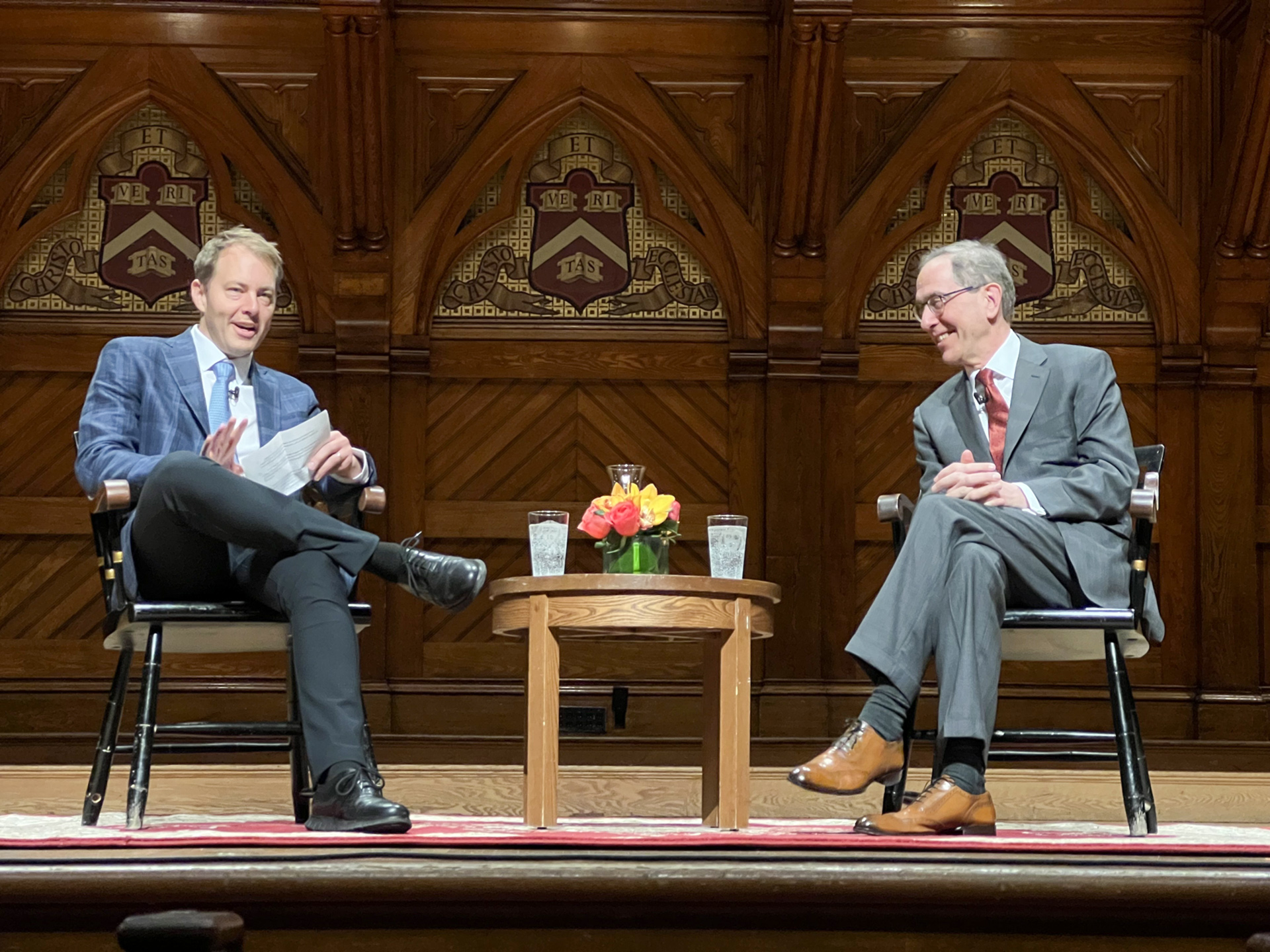
David Deming (left) and Christopher Eisgruber.
Photo by Anna Lamb
Princeton leader defends campus free speech efforts amid ‘civic crisis’
Eisgruber, author of ‘Terms of Respect,’ says tensions reflect wider U.S. divisions
U.S. colleges and universities have for the most part done a good job protecting and promoting campus discourse in recent years, according to Princeton President Christopher Eisgruber. They have not, however, escaped the divisions affecting institutions and communities across the country.
“There’s a genuine civic crisis in America,” Eisgruber said in a conversation with David Deming, Danoff Dean of Harvard College, on Nov. 5 at Sanders Theatre. “It is true that all of us are having a harder time talking to one another now than we had in the past, and that’s true for colleges as well. What I deny is that colleges or the younger generation are doing worse in that kind of environment.”
Eisgruber’s new book, “Terms of Respect: How Colleges Get Free Speech Right,” reflects on lessons he’s learned as the leader of Princeton for more than a decade, and during rising U.S. polarization. In his talk with Deming, he expanded on themes covered in the book and spoke from experience, some of it sharp-edged, on the challenges of handling campus tensions in real time.
Among them: headline-grabbing student protests of campus speakers at schools across the country. At Princeton, Eisgruber supports faculty and student efforts to welcome speakers who challenge status-quo views. He’s not interested, however, in promoting empty provocations or people who seem interested only in fueling the flames of conflict.
Scholars and students “have tremendous freedom to make those invitations,” he said. “Inviting noted political figures to campus who are very controversial can be a very valuable thing for people to do. Inviting people who are coming as provocateurs, I think, is a much less valuable thing to do.”
“Inviting noted political figures to campus who are very controversial can be a very valuable thing for people to do. Inviting people who are coming as provocateurs, I think, is a much less valuable thing to do.”
An area where colleges have stumbled is in balancing the right to protest with their obligation to maintain a safe and productive campus environment, Eisgruber said, pointing specifically to a student occupation of a Princeton building during a 2015 Black Justice League protest. The university faltered, he said, by allowing the demonstration to interfere with everyday operations.
“I think maintaining that constructive environment where everybody feels like they can be a part of the conversation on equal terms means that when there’s a disruption going on in the university’s business, and you’ve got a set of rules, and your rules say this is the point where you have to leave, you have to enforce them,” he said.
Even so, he argued, campus protests demonstrate a sustained commitment to free speech on the part of universities — not the other way around.
“When you have a really great free speech environment, which I maintain Harvard does, you’re going to get controversy on the campus, which means sometimes you’re going to see disruptions,” he said. “That’s not the right way to count free speech. If I’m an accountant — what do I want to look for? I want to look for engagement. I want to look for argument. I want to look for controversy.”
Engagement, argument, and controversy remain alive and well on U.S. campuses, he said, but are now under pressure and scrutiny that grow more intense as social media and other forces stoke conflict.
“Colleges get free speech right through millions of conversations like this one or ones that take place in dorm rooms or dining hall tables or at public events or classrooms in colleges and universities across the United States every year.
“We are in a time in America when it’s hard to have the conversations that really matter. We’re in a time in America characterized by extreme polarization that leads people to demonize folks who are on the other side of arguments, and we’re at a time in America when social media has created different kinds of incentives that make constructive conversation difficult.”




